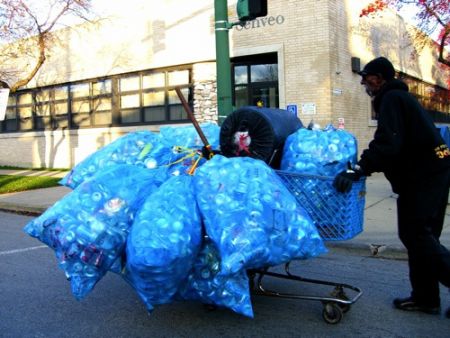HALIFAX — A grassroots coalition of advocates for low-income people is upset that HRM Council is recommending that the province abandon the five-cent deposit on recyclabe bottles.
In a letter to HRM Mayor Mike Savage, Amy Moonshadow voices her opposition in no uncertain terms.
“The current system provides much needed cash for some of HRM's lowest income residents, as well as providing steady work at bottle depots for citizens that have often been marginalized,” writes Moonshadow, the chair of the Community Advocates Network.
“To do away with this system is tantamount to poor-bashing, saving less than a million dollars to the city, at the expense of the city’s lowest income residents. This is quite simply unacceptable."
Today, consumers in Nova Scotia pay an extra 10 cents on top of the sticker price each time they buy a bottle of pop. Five cents of that goes to various recycling programs administered by the Resource Recovery Fund Board (RRFB).
Much of this money is funnelled to municipalities to support their waste reduction strategies. The remaining five cents is refunded to the consumer when a bottle is returned at one of Nova Scotia's 80 independently owned Enviro-Depots, situated throughout the province.
The proposal by HRM Council is to continue to charge the five cents used to fund recycling programs, but to eliminate the five cent returnable bottle deposit. Bottles would simply be recycled through the municipal blue bag curbside recycling program.
HRM staff told council that eliminating the bottle deposit and getting rid of of the so-called Enviro-Depot network managed by the RRFB would see municipal coffers grow by $3 million. To continue to sustain the deposit-and-refund system would see a $800,000 reduction in the the money allocated to HRM by the board, which is struggling because of rising operating costs.
The motion recommending that the province do away with bottle refunds was tabled by councillor Jennifer Watts. The entire council voted in favour, except for David Hendsbee.
Opposition to the idea has been broad and vocal among citizens. Letters to the editor and callers to radio shows are almost unanimous in rejecting the idea, pointing to the negative impact on the environment, on charities who collect bottles to fund raise, and the job loss of depot workers that will inevitably result.
The Community Advocates Network now adds its voice to this growing choir of opposition. Wayne MacNaughton, a spokesperson for the group, raises the plight of bottle collectors, the people who collect bottles from roadside ditches and curbside recycle bags.
“This is how they are making their living or supplementing their living. It is hard work for which they get very little pay at the end of the day,” says MacNaughton. “You see him going down the street, and he is heading into the bottle depot with blue bags hanging off the cart, and he is going to get maybe $30. That is a whole lot of work for very little money, but it is money he earned himself.”
HRM staff sees it differently. What MacNaughton calls hard work the HRM staff report calls “scavenging" that "has introduced nuisance and litter issues into neighbourhoods and is another negative outcome of the refundable deposit program.”
The group representing Enviro-Depots is also voicing opposition to the proposed plan. Bruce Rogers, executive director of the Eastern Recyclers Association, says that “[i]f the Province follows up on the HRM council recommendations, then without a doubt the 300 people who work at the depots will be out of a job.” Rogers also says HRM has a bad track record when it comes to waste management and predicts that ultimately the taxpayer will end up paying more if depots are eliminated.
Neither depot jobs nor the plight of the low income bottle collectors figured at the council debate. Watts said that it is merely suggesting one scenario, “but this is a conversation and other scenarios will emerge.”
MacNaughton rejects Watts's statement as disingenuous. “Saying that is a bit cowardly. There is a bad habit in council: they will oppose something and then vote in favour. That really is cheap politics. If they have reservations they shouldn't vote for it.”
Watts did not return phone calls for this story.
For MacNaughton and the Community Advocates Network, council's reluctance to consider poverty issues is part of a larger pattern. MacNaughton points to a proposed 25-cent increase in transit fares as another example of a measure that will make the life of people on low income more difficult.
And they are deeply disappointed in the newly elected mayor and council.
“Mike Savage, while running for mayor, talked about taking action on poverty, and now this,” sighs MacNaughton.



